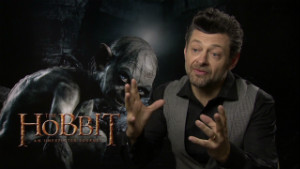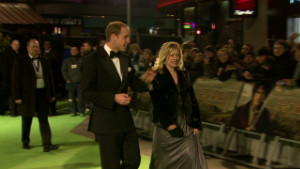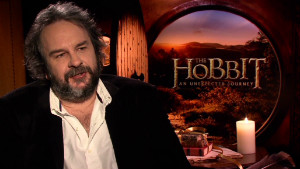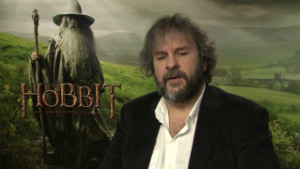- "The Hobbit: An Unexpected Journey" is the first in a trilogy adapted from Tolkien's first novel
- The film is just shy of three hours and takes the story up to chapter seven
- Critic says new technology displayed in the film does not serve it well
(CNN) -- They say the longest journey starts with a single step.
But with "The Hobbit: An Unexpected Journey," the first in a trilogy adapted from J.R.R. Tolkien's first novel, Peter Jackson has taken a different approach: He's gone two steps forward and three steps back.
In the process he's undoubtedly made himself a whole lot richer. "The Hobbit" is dominating screen space across the globe this weekend, and will certainly be among the biggest moneymakers of the year. But he's also jeopardized the legacy of his own "Lord of the Rings."
Fans won't want to hear it, but "An Unexpected Journey" is a major comedown, a muddle-headed and cumbersome piece of filmmaking that betrays Jackson's mercenary motives -- Tolkien's book, too. "The Hobbit" is far lighter work than what followed, and at approximately 350 pages, hardly crying out for the 10-hour magnum opus treatment (but three films are so much more profitable than one!)
For fans, 'Hobbit' is a family reunion
 'Hobbit' stars weigh in on 3-D critics
'Hobbit' stars weigh in on 3-D critics
 Prince William meets cast of 'The Hobbit'
Prince William meets cast of 'The Hobbit'
 Peter Jackson: Iconic moments are vital
Peter Jackson: Iconic moments are vital
 Stars reveal Tolkien power wish list
Stars reveal Tolkien power wish list
In just shy of three hours, "An Unexpected Journey" takes the story up to chapter seven -- about 140 pages in my paperback edition.
Jackson has shown his elephantine tendencies before, in the bloated and indulgent extended editions of the "Rings" films. But in the earlier trilogy -- which I admired and enjoyed, incidentally -- he clearly showed he had the measure of the material and understood both Tolkien's moral convictions and the books' darker forebodings of impending death and destruction.
Even if it's something of a dry run for Frodo's odyssey, "The Hobbit" is a different beast. There's so much less at stake in the story of Bilbo Baggins (Martin Freeman) joining Gandalf (Ian McKellen) and a band of dwarves in a raid on a dragon's mountainous lair.
This is an adventure story, a caper with elves and goblins. And yet Jackson gives it the same portentous, heroic swagger; the same doomy menaces. It's just that this time the action is spooned out in thimbles. The rest of the running time is given over to dwarfish humor, endless, unfunny comic bluster and banter interspersed with duff warrior dirges and desperate close-ups of Freeman mugging.
"Sluggish" doesn't begin to do justice to the way Jackson has padded out his narrative. But there's worse, far worse, for anyone tempted to check out the movie in its 3-D, 48 frames per second incarnation (showcased in approximately 450 premium screens across North America). The theory behind this cutting edge technology -- which doubles the 24 fps that has been standard in movies since the silent era -- is that the faster frame rate allows more luminescence, counterbalancing the loss incurred in 3-D. It's clearer, brighter and more immersive -- in theory. In practice, it's clearer, brighter, and utterly alienating.
I haven't seen the movie screened at 24 fps, but at 48, the grain of film has been replaced by the gloss of high definition video, which gives everything and everyone a fake, plastic sheen.
"An Unexpected Journey" may look sharp in TV showrooms or on your PS3, but in the movie theater the picture's clarity comes at the loss of texture, shading and consistency. Shifts from exteriors to dark interiors are especially jarring. Look also at the dull, flat orange taint that is meant to approximate candle light in numerous scenes, and compare that with the glow you find in "Barry Lyndon," or "Fanny and Alexander," or your own birthday snaps.
Did Jackson embrace 48 fps to keep himself interested, because he knew he was retreading old ground? Is he really blind to the limitations of this technology at this stage of its evolution? I won't say it has no future, but for now this emperor has no clothes. It's a colossal misjudgment. He's put his name to the ugliest film of the year, a $270 million three-hour epic that looks like a TV show ("Teletubbies" was the first to pop into my head, and "Doctor Who" was the most flattering comparison I could come up with.)
In fairness, there are redeeming features: The movie does sputter into life in the last 45 minutes, especially during a lengthy battle of wits between Bilbo and Gollum. And Ian McKellen miraculously, alone among the cast, transcends the picture's artificial surface and imposes himself on such drama as he can find.
In my book that's not enough return for three hours at the movies, or whatever inflated price they're charging for your ticket now.